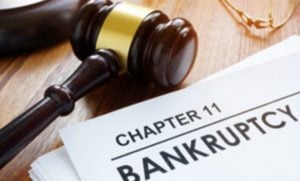In what was one of the first major retail bankruptcy since the novel coronavirus struck the US, J Crew recently filed for Chapter 11 protection. Then, Neiman Marcus became the first major department store to file for bankruptcy during the pandemic. Gold's Gym was up next and the list goes on. Those retailers are just a few of the many companies facing restructuring and bankruptcy.
The challenges these retailers and other real estate companies will face as they restructure are numerous and include recruitment, onboarding, legal and financial challenges.
Rebuilding the Board
One important but often overlooked challenge should be added to that list: properly restructuring a board post-bankruptcy, according to Rusty O'Kelley, co-leader of the Board & CEO Advisory Partners and global leader of Board Consulting and Effectiveness Practice at Russell Reynolds Assoc.
 Rusty O'Kelley, co-leader of leadership and executive search firm, Russell Reynolds Assoc.
Rusty O'Kelley, co-leader of leadership and executive search firm, Russell Reynolds Assoc.He tells GlobeSt.com that when it comes to rebuilding a board, there is a clear roadmap to success. The first step? Start early. O'Kelley notes that too many companies wait until late in the restructuring process, but that leads to rushed results.
Second step, he says, is identify the key tenant, the board chair. "Just like in real estate, having a strong name in that seat will help with recruitment for the other open spots."
The third step is to determine the optimal size. "Larger isn't always better with corporate boards." He adds that a small team of strong performers can have a big impact.
The fourth, O'Kelley explains, is to look for the right mix of experiences. "The group as a whole has to tick all the boxes, and each individual has to work well together."
Lastly, it is key to be clear on the opportunities and the risks. This, he says, will be a substantial undertaking for everyone involved, and everyone needs to be aligned on common objectives, with the potential of significant reward.
 Los Angeles-based Deb Barbanel, who specializes in real estate and leads the Global Real Estate Practice and is also a core member of the Board & CEO Advisory Partners at Russell Reynolds Assoc.
Los Angeles-based Deb Barbanel, who specializes in real estate and leads the Global Real Estate Practice and is also a core member of the Board & CEO Advisory Partners at Russell Reynolds Assoc.
Watching the Metrics
As companies struggle to regain their footing, they must scour all indicators to see how they are performing in real time. These companies should look at everything, says Los Angeles-based Deb Barbanel, who specializes in real estate and leads the Global Real Estate Practice and is also a core member of the Board & CEO Advisory Partners at Russell Reynolds Assoc. "They are looking at everything from monthly rental income to debt covenants to the financial health of their tenants." If they are a publicly traded company, she adds, they are seeing their stock price every day, "knowing that it doesn't reflect the true value of the portfolio, which creates other stresses."
Recruitment
Recruitment in real estate is a challenge right now, but not impossible, with firms being creative on important or truly accretive hires, Barbanel explained. She tells GlobeSt.com that "there are few industries that are more personal, high touch, or more built on in-person meetings. Real estate professionals respect and thrive being together."
What that means in terms of recruitment, she adds, is that it is in a bind, at least at the executive level. "For the most part, executive searches are continuing, and interviews are taking place virtually, but for senior-level hires, it is highly unlikely that an offer will be made until a final in-person interview can occur."
In looking more junior in an organization, such as VP-level and below, certain firms are proceeding ahead with hiring, she explains. "Real estate companies are becoming more advanced in their ability to onboard virtually, to leverage technology and virtual tools, and to bring new employees up to speed quickly, even when completely remote."
Rethinking Composition
According to Barbanel, going through a bankruptcy also provides a company the opportunity to rethink their composition. "Many real estate boards are filled with real estate professionals, but would benefit from looking at directors with diverse backgrounds, especially those with skill sets related to digital and technology, consumer industries, and marketing," she says. "Each of these areas are critical to real estate companies right now, and board-level expertise would be incredible valuable."
Additionally, she says, "making sure the full board is fluent in ESG issues, especially sustainability given real estate's impact on the environment, will be critical in the coming years. To not be well versed as a board is to likely miss out on substantial growth and value-creating opportunities as a company."
Diving Into the Sectors
As GlobeSt.com has reported, hospitality and retail are in tremendous pain as consumers are not out shopping or traveling. According to Barbanel, the office sector is also feeling uncertainty because "while most white collar businesses are still open, there is an open question around how long people will work from home, and how companies will adjust their space needs over the coming years." Relatively speaking, she adds, industrial and data centers are doing well and residential is holding okay right now. Homebuilders, however, have seen a meaningful slowdown and are struggling to show and sell lots and homes, she adds.
Keep an eye out for the June issue of GlobeSt. Real Estate Forum where we examine leadership issues including transparency and open communication. Also, check out our March issue, where we took a deep dive into all things ESG.
© Touchpoint Markets, All Rights Reserved. Request academic re-use from www.copyright.com. All other uses, submit a request to [email protected]. For more inforrmation visit Asset & Logo Licensing.








